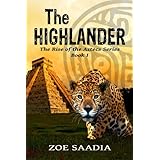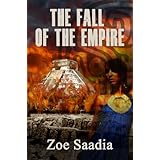What
is style? Written Words continues to explore the issue of style among
independent authors. This time, I’ve asked historical novelist Zoe
Saadia to weigh in.
Saadia
is unique among writers of historical fiction. Her novels, like At
Road’s End, The Warrior’s Way, The Highlander and her latest, Two
Rivers, are set in pre-European contact North America. The cultures
of the place and time play very important roles in the stories. These
factors place a particular challenge for the novelist, whose job it
is to bring the audience into the created world.
I
faced a similar challenge, if not as steep, with my historical
fantasy, The Bones of the Earth, set in Dark Age eastern Europe. At
least in my case, I could find some historical information about the
peoples and the cultures of that setting. Pre-Columbian Americas,
though, have less background information readily available.
That’s
what I asked Zoe first.
Your
books are set in a place and time unusual, if not unique, in
literature: pre-Columbian MesoAmerica, specifically the Toltec, Aztec
and Mayan cultures. What was it that inspired you to write historical
fiction in that setting?
My main goal is to present pre-contact Americas to the wide audience of readers, to make people discover and enjoy these neglected cultures and periods.
For some reason, historical novelists paid no attention to such large chunk of history, while doing to death all those well familiar times and places. Rome and Greece, Medieval Europe, Stuarts and Tudors and the Regency’s sparkling balls and receptions, all those and more have tomes of wonderful historical fiction to represent them, plenty of movies to fill our screens; while two large continents prior to their “discovery” seem to have no history at all — judging by the historical fiction genre, that is. Their conquest is well covered, and the post-conquest times, but what was there before?
Well, fifteen years of research had shown me that there were many fascinating things to find in pre-contact Americas, many different cultures, ways of life, upheavals and revolutions, empires rising and falling, democracies being born. A wonderfully rich field for historical novelist, and so far untouched by others – what a treasure
So for now I have Central America covered with “Pre-Aztec” and “The Rise of the Aztecs” series, presenting the turbulent Mesoamerican history of the 14th and 15th centuries and how the well-known (to us) “Aztec” Empire came to rise.
My North American books, the Peacemaker Trilogy, cover the process through which the great Iroquois confederacy was born — the famous democracy the constitution of which inspired quite a few clauses in the modern-day USA constitution (a fact admitted by the Founding Fathers in quite a few letters).
How
long does the research take for one of your novels? What sources do
you use?
The initial research takes long, a few years and more, but as I write series, I use the already accumulated information for one novel for the next. This way the research and the writing advance alongside each other.
For example, when I was writing the novels of Pre-Aztec series, which are set in the capital of the regional power that preceded the familiar Aztec empire, I did not intend to write “The Rise of the Aztecs” series.
Yet, as the general story progressed along with the research, I found myself yearning to learn more. The cultural details of the daily life were already there, the people’s mentality, their attitude, their way of life. So, I checked and rechecked the facts outlining the events. Tthe conquered cultures are always more difficult to research, as the original documents get destroyed and the version of the past events reported to us by the conquerors is terribly distorted, coated with a thick layer of unashamed propaganda.
This way it was much easier to write the next series, with even some of the characters sneaking in, insisting on their own private history being developed beyond the general happy, or unhappy, previous ending.
How
would you describe your own writing style?
My writing style is not a customary way of writing historical fiction. As I truly want to make a wide range of people discover the cultures I’m featuring in my novels, I write in a lighter style of action-adventures stories, as much for history lovers as for the enjoyment of a person who would not pick a history book given a choice.
So, while grounded in solid, well researched history, my stories are full of action, centered around all sorts of people, fictional and historical characters, behaving like regular men and women with feelings and desires of normal human beings all around the globe and in all times. Cultural values and technology aside, to my firm belief, people were always people, with their basic needs and ambitions, in Caesar’s Rome, Napoleon’s France, Moctezuma’s Tenochtitlan or modern-day New York City.
So, as I myself love fast-paced, easily flowing books to read, I make a point of writing my stories in this way, full of action, adventure and humor whenever possible.
What
are the important elements of your style? What are you trying to
achieve?
I want to make people discover pre-contact Americas; to meet the fascinating nations and cultures that inhabited these lands, all those various different civilizations. I want to break the terribly wrong image the colonial books and records created, which Hollywood cemented later on with its terribly distorted Westerns. This is my main goal
One
challenge for writers of historical fiction is finding the
appropriate “voice,” particularly in dialogue. How do you write
dialogue that is at once reflective of the characters’ culture, and
not outlandish or irritating to the readers?
Oh yes, it is a challenge. The cultural conceptions are, indeed, difficult to “translate” to our language, sometimes.
But then, it’s a very interesting, satisfying challenge — to make your characters likeable, understandable to the modern-day readers, while avoiding turning them into modern people dressed in costumes. There is nothing more irritating for me as a reader of historical fiction as running into a shallow historical novel full of modern-behaving characters.
To avoid that, good cultural research helps. To just sift through the heap of the historical records is not enough. One needs to understand the people one is writing about, sometimes by enlisting the help of the modern-day history enthusiasts from these areas, many times the descendents of the involved cultures. I’m very lucky to have many friends all over Mexico, people who help me understand the events I may have misinterpreted otherwise, people who even are teaching me Nahuatl, the original language of the Aztecs and the other local peoples, which is still very much in use all over the western Mexico.
This way the characters of my books behave naturally, making the readers sympathize with them and their action, even though some of these may not make sense according to our values.
Are
there any authors whose style you admire? Do you try to emulate them?
My main idols are Colleen McCullough and James Clavell, both exceptional historical novelists, whose every book I reread many times. Each time, I learn about different times and cultures without noticing, while enjoying myself immensely. Both these authors made me realize the power of the historical fiction as opposed to the non-fictional historical accounts.
As for emulating, I suppose I tried to emulate them in the beginning, but today I think I developed my own style. Still, if likened to one of them, I would be extremely flattered.
Are
there authors whose writing style you dislike?
I have trouble with over-descriptive writing style of many old-day classics.
Do
you think your type of literature, historical fiction, imposes
certain restrictions on writing style?
No, I don’t think so. I found that a novel is a novel, that every story could, and in my opinion should, be full of action, with the fictional side coming ahead of the historical one. The historical and cultural backgrounds are very important, but the story itself is more so. The trick is to manage to keep this balance
Do
you think your audience responds to your writing style, consciously
or unconsciously?
Oh yes, I think they are.
For one, many people who don’t read historical fiction in general, seem to enjoy my books, appreciating the reader-friendly style of mine.
On the other hand, sometimes I get criticized by the hard-core history fans, who are expressing their doubts regarding the depth of the historical research behind my novels. To their opinion historical novel should be suitably heavy, full of excessive descriptions. Luckily, those are not many, not enough to make me start doubting my style.
I do want to reach many people, to make them learn history without noticing, while enjoying a good story, like a good historical fiction should do.
How
important do you think writing style is to an author's commercial
success?
I think it’s very important. Especially today, with the television providing a serious competition, we have to keep up, not make it most enjoyable for the readers, easy to read and to lose yourself in the story.
Thank you so much for your fascinating knowledgable questions, Scott. I enjoyed myself immensely, answering them!
Thank
you, Zoe!
After
years of researching Classic ancient Meditterranean history, Zoe
Saadia turned to the Great League of the Iroquois and their amazingly
detailed constitution. The common points and differences in the two
cultures and their take on democracy spurred more research and study,
and eventually led Saadia to write two series set in pre-Columbian
Mesoamera: the “Pre-Aztec” series (At Road’s End, The Young
Jaguar, The Jaguar Warrior and The Warrior’s Way), and the “Rise
of the Aztecs” series (The Highlander, Crossing Worlds, The Emperor’s Second Wife and
Currents of War).
Her
newest series is set among the Iroquois Confederacy: Two Rivers,
Across the Great Sparkling Water, and The Great Law of Peace.
Zoe
Saadia is a founding member of Independent Authors International.
Visit
her website and blog, Pre-Columbian Americas.





Great interview and tips for writing historical novels. Thanks for sharing. I've only heard tremendous things about your novels, Zoe. I look forward to delving into them one day. :)
ReplyDelete